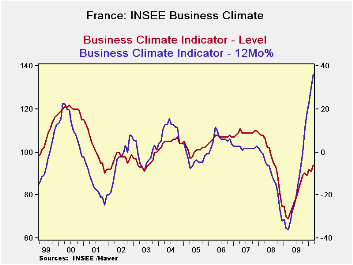 Global| Mar 23 2010
Global| Mar 23 2010French Business Climate Gets Better As Political Climate Gets Worse…
Summary
France’s business climate indicator complied by Insee, rose to 94 in March from 91 in February. This is its best standing since August of 2008. Still it is not a good level. The climate indicator is only in the 47th percentile of its [...]

France’s business climate indicator complied by Insee, rose to 94 in March from 91 in February. This is its best standing since August of 2008. Still it is not a good level. The climate indicator is only in the 47th percentile of its range values over the past two decades. If we place the current reading in a queue, instead of just positioning it between its highs and lows, it stands in the lower 30% of its two-decade queue of monthly values.
The momentum of the index is still strong as the Yr/Yr percentage gain reading tells us. But the level is still not at an acceptable point. At the same time President Sarkozy has implemented reforms that in these hard times are unpopular. He has lost a key regional election. On Tuesday a two-day national strike called by public sector works deals another blow to the Sarkozy government. About half the trains were running on Paris commuter lines on Tuesday morning, while nearly two-thirds of national high-speed TGV services were operating, according to a French news agency. National rail operator SNCF said services would be uneven until early on Wednesday. Teachers are protesting over job cuts and joining the demonstration, along with other public sector workers complaining about conditions at work and their lack of spending power.
Despite some sharp improvement in economic conditions the huge fiscal help offered by the government has reached its limits. Attempts to pull back and inject fiscal prudence are not being well-accepted in France.
The economic indicators say that Sarkozy’s management of the economy has helped put it on a continuing expansion. But the political airs tell us that that it is still not enough improvement for the French people who do not want and further adjustment pace on their back. France is at an impasse of sorts.
So this is the newest wrinkle in Euroland. But there is anther re-wrinkle to the ongoing Greek crisis and Germany’s opposition to giving Greece help within the zone and its opposition to Greece being helped by the IMF. It is hard to understand what the German’s have to gain by dogging a beleaguered Greece in this way. But the Greek problem, once thought to be fading to the background is now again a front line euro story and it is once again a reason for some new euro-weakness.
| INSEE Industry Survey | ||||||||||
|---|---|---|---|---|---|---|---|---|---|---|
| Since Jan 1990 | Since Jan 1990 | |||||||||
| Mar 10 |
Feb 10 |
Jan 10 |
Dec 09 |
Percentile | Rank | Max | Min | Range | Mean | |
| Climate | 94 | 91 | 92 | 89 | 47.2 | 170 | 122 | 69 | 53 | 100 |
| Production | ||||||||||
| Recent Trend | -6 | -4 | -4 | -10 | 57.6 | 117 | 44 | -74 | 118 | -8 |
| Likely trend | 4 | -3 | -3 | -5 | 62.9 | 134 | 30 | -40 | 70 | 5 |
| Orders/Demand | ||||||||||
| Orders&Demand | -45 | -48 | -46 | -52 | 22.2 | 215 | 25 | -65 | 90 | -17 |
| FgnOrders&Demand | -38 | -46 | -45 | -54 | 32.4 | 211 | 31 | -71 | 102 | -13 |
| Prices | ||||||||||
| Likely Sales Price Trend | -6 | -8 | -8 | -18 | 36.2 | 166 | 24 | -23 | 47 | 0 |
Robert Brusca
AuthorMore in Author Profile »Robert A. Brusca is Chief Economist of Fact and Opinion Economics, a consulting firm he founded in Manhattan. He has been an economist on Wall Street for over 25 years. He has visited central banking and large institutional clients in over 30 countries in his career as an economist. Mr. Brusca was a Divisional Research Chief at the Federal Reserve Bank of NY (Chief of the International Financial markets Division), a Fed Watcher at Irving Trust and Chief Economist at Nikko Securities International. He is widely quoted and appears in various media. Mr. Brusca holds an MA and Ph.D. in economics from Michigan State University and a BA in Economics from the University of Michigan. His research pursues his strong interests in non aligned policy economics as well as international economics. FAO Economics’ research targets investors to assist them in making better investment decisions in stocks, bonds and in a variety of international assets. The company does not manage money and has no conflicts in giving economic advice.
More Economy in Brief
 Global| Feb 05 2026
Global| Feb 05 2026Charts of the Week: Balanced Policy, Resilient Data and AI Narratives
by:Andrew Cates






